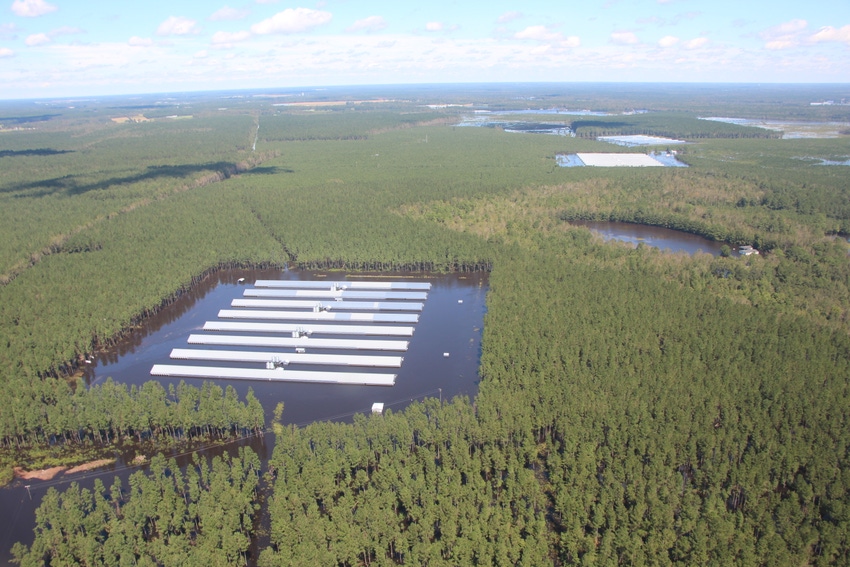Commissioner of agriculture asks state legislators for $310 million aid package.

Even as Hurricane Michael unloads destruction in the Gulf states, more extensive information regarding Hurricane Florence’s impact on North Carolina and how the state plans to recover is being divulged.
An update from the North Carolina Pork Council (NCPC) noted that the historic storm dumped more than 8 trillion gal. of water on North Carolina over a four-day period, causing billions in damage and claiming more than 50 lives.
“Hurricane Florence impacted every major industry in our state, damaged homes and schools and severely impacted roads, bridges and civic infrastructure,” NCPC said. “The storm’s record-shattering rainfalls dumped more than 2 ft. of rain across a vast area, including several of our state’s largest hog-producing counties. Many areas saw more than 30 in. of rain.”
North Carolina commissioner of agriculture Steve Troxler this week said after seeing all of the destruction from land and air, he would describe the storm as an “unbelievable, catastrophic disaster.”
Troxler asked state legislators Monday for a $310 million aid package, most of which would be allocated for direct payments to farmers who lost crops and livestock in the storm. Preliminary crop and livestock damage is estimated at approximately $1.1 billion, with the economic impact at $2.8 billion, he said.
“I think everybody knows that Hurricane Florence was a devastating storm that has left tremendous destruction in its wake,” Troxler said, adding that recovery is going to take more than just months but, rather, years.
Hurricane Florence agriculture losses |
Soybeans |
Corn |
Cotton |
Flure-cured tobacco |
Hay |
Peanuts |
Sweet potatoes |
Vegetables |
Pork |
According to The State, Troxler said $250 million of the $310 million request would go into a yet-to-be-developed Farmer Recovery Reinvestment Program, which would pay farmers with uninsured and under-insured crop, livestock and poultry losses to help them remain in agriculture.
“There is a world of economic hurt in the farming community of eastern North Carolina,” he said during a press conference Tuesday. “The reason I proposed this package yesterday [is because] if we don’t help these farmers go in to the people that they owe money to and be able to make payments to get back to the point that they can have operating funds for next year, they won’t be able to farm.”
North Carolina Gov. Roy Cooper also shared his state budget recommendations this week for Florence recovery and future storm resiliency. As of right now, preliminary damage estimates from Florence total almost $13 billion. To cover the state's portion of the recovery efforts, Cooper recommends a robust, $1.5 billion package to tackle a smarter, stronger recovery.
“Hurricane Florence devastated our state and left families, businesses and farmers reeling from the impact,” Cooper said. “From this devastation, we must seize the opportunity to rebuild smarter and stronger. I have spent the last month visiting survivors, surveying damage, thanking volunteers and first responders, and I know that we will come out better from this tragedy if we can work together.”
Cooper recommends that the legislature make an initial down payment by funding $750 million, or half of the total state portion, when it returns for a special session next week.
For context, Hurricane Matthew caused $4.8 billion in damages, and Hurricane Floyd caused between $7 billion and $9.4 billion in damages when adjusted for inflation, meaning that Florence caused roughly as much damage as Floyd and Matthew combined.
Hog industry impact limited
NCPC said the impact on hog farms was a relatively limited component of the more than $1.1 billion in damage and losses to the agricultural community.
“Our pig farmers were well prepared for the storm and came together in its wake to provide feed and fuel to those farms in need immediately following the storm,” the council said.
According to NCPC, Hurricane Florence resulted in the loss of approximately 5,500 swine across the state -- a small portion of the approximately 9 million hogs and pigs in the state. The losses were caused by a combination of wind damage, power outages and floodwaters.
"Farmers in flood-prone areas limited damages by moving more than 20,000 pigs to higher ground before the storm,” NCPC added.
The North Carolina Department of Environmental Quality reported that six farms with anaerobic treatment lagoons suffered structural damage, eight farms saw inundation of their lagoons with floodwaters and 28 farms with lagoons experienced overflows from the rainwater during the hurricane. The structural damage ranged from a breach in three instances to “cracks” in the dike wall or less significant structural impacts. More than 98% of North Carolina’s 3,300 active lagoons did not experience these significant issues, NCPC said.
NCPC noted that the heroic actions of farmers have been one of the lasting stories of the storm, including the “men and women who slept in the barn with their animals to ensure their safety, who delivered feed by the bucketful when automatic feed systems were knocked off line and who traveled by boat to check on their barns surrounded by floodwaters.”
Fewer hog farms located in 100-year floodplain
Since Hurricane Floyd hit in 1999, NCPC said the state’s pork industry has worked hard to protect farms from storms like Hurricane Florence. In fact, it said more than 325 hog lagoons located in the 100-year floodplain have been permanently closed in the past 20 years.
“The North Carolina Pork Council has supported a voluntary buyout of farms located in the 100-year floodplain and is pleased that commissioner Troxler and the [North Carolina] Department of Agriculture have secured $5 million in state and federal funding to continue this program. It is estimated that about 60 hog farms are currently located in the 100-year floodplain.”
The North Carolina Farm Bureau (NCFB) announced Oct. 11 that, due to Hurricane Matthew and Florence, the North Carolina Department of Agriculture & Consumer Services is restarting the floodplain buyout program for hog farms. Though voluntary, the program reduces the risk of environmental issues during hurricanes.
NCFB said this is the fifth time the program has been offered since it began in 2000 following devastating flooding from Hurricane Floyd.
Forty-three of the 138 producers who submitted applications in the initial four rounds of the program were selected to participate. Producers who submitted bids that were not accepted previously are invited to submit new bids, NCFB noted.
About the Author(s)
You May Also Like



